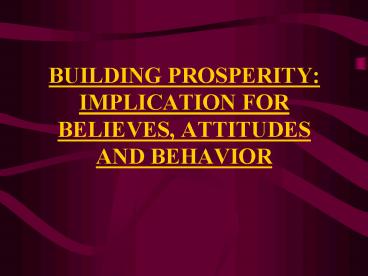BUILDING PROSPERITY: IMPLICATION FOR BELIEVES, ATTITUDES AND BEHAVIOR - PowerPoint PPT Presentation
1 / 16
Title:
BUILDING PROSPERITY: IMPLICATION FOR BELIEVES, ATTITUDES AND BEHAVIOR
Description:
This discussion of the microeconomic foundations of competitiveness reveals some ... These can be contrasted with unproductive attitudes and values. Monopoly ... – PowerPoint PPT presentation
Number of Views:33
Avg rating:3.0/5.0
Title: BUILDING PROSPERITY: IMPLICATION FOR BELIEVES, ATTITUDES AND BEHAVIOR
1
BUILDING PROSPERITY IMPLICATION FOR BELIEVES,
ATTITUDES AND BEHAVIOR
2
This discussion of the microeconomic foundations
of competitiveness reveals some of the believes,
attitudes and values that support and promote
prosperity.
3
Most basic belief is prosperity depends on
productivity Secondly potential for wealth is
limitless because it is based on ideas and
insights, not fixed because of scare resources.
4
This zero-sum worldvew is central to the theory
of a univercial peasant culture.
5
The productivity paradigm gives rise to a whole
series of supportive attitudes and values
- Innovation
- Competition
- Accountability
- High regulatory standarts
- Investment in capablities and technology
- Employees
- Membership in a cluster
- Collababoration with supliers and customers
- Connectivitiy and networks
- Education and skills
- Wages should not rise
6
These can be contrasted with unproductive
attitudes and values
- Monopoly
- Power determines rewards
- Rigid hierarchy is needed to maintain control,
- And self-contained family relationships should
determine partnership.
7
- Differences among groups and individuals
- Heavy weight is attached to government leaders
and business elites. - A strong government may impose a productve
economic culture - Sustained development will required
- A big part of the task in economic development is
educational
8
WHY DO NATIONS HAVE UNPRODUCTIVE CULTURES?Why
do these persist in certain societies? Do
individuals and companies knowingly act in ways
that are counter to their economic self
interest?
9
- First economic culture in a nation is strongly
influenced by the prevailing ideas or paradigm
abouth the economy. - Military regimes often like import substitution
and self-suffcency policies - Economic culture appears to be heavly deriver
from the past and present microeconomic contex
10
- Nations work ethic can not be understood
independently of the overal system of
incentivenes in the economy - History places a strong imprint on economic
culture, both from experiences during good
times and those during bad times. - Social policy choises can have a strong influence
on economic culture because they influence the
economic contex
11
- Beliefs, attitudes and values that are
unproductive can be changed if they are no longer
reinforced by prevailing beliefs or by the
contextual reality faced by citizens and
companies.
12
GLOBAL CONVERGE AROUND THE CULTURE OF
PRODUCTIVITY
13
- Historically, world political and economic
circumtances offered scope for wide variations in
the economic culture. - Different economic models reflected the
prevailing circumtances. - Protectionist policies in many countries
created more self-contained world.
14
- Today knowledge abouth the elements of
productive economic culture is spread. - In the global world foreign investment
dries up if nations dont provide a prductive
business environmen. - Globalization provides a powerful dicipline
on unproductive behaviors.
15
Forces in the new economy are so strong that it
is no over statement to suggest that economic
culture is no longer a matter of choice.
16
A SET OF BELIEFS, ATTITUDESAND VALUES WILL BE
COMMON, AND THE CLEARLY UNPRODUCTIVE ASPECTS OF
CULTURE WILL FALL AWAY UNDER THE PRESSURE, AND
OPPRTUNITY OF THE GLOBAL ECONOMY































